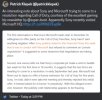From the lawyer
——————
There is a new document from the CMA:
a summary of third party calls (4 pages)
Some highlights (there is more):
- Calls or meetings with six third parties during the period from October 2022 to January 2023.
- Each of these third parties is a competitor or a potential competitor with the merged entity in either console gaming services or cloud gaming services.
- Topics addressed: The third party's relationship with Activision, Microsoft, and any other game developers and publishers; game publishing; cloud gaming, multi-game subscription services, operating system, the merger, etc.
- Some third parties referred to Microsoft Xbox, Sony Play Station and Nintendo Switch as competitor platforms, though Nintendo was perceived as differentiated on several bases.
- Two third parties identified the availability of attractive first and third-party content as key to a platform's success.
- One third party characterised Call of Duty as unique and a driver of console purchase decision-making given its fast development cycle and large, highly engaged audience.
- One third party contended that Microsoft's recent acquisition behaviour, including its acquisition of Bethesda and subsequent platform-publishing policy, demonstrates a strategy aimed at foreclosing rival gaming platforms, which would harm consumers
- One third party contended that Microsoft is already dominant in the multi-game subscription space and that the Merger would entrench that position.
- The majority of third parties viewed cloud gaming as a nascent market. They suggested that its success will be dependent upon the resolution of a number of technical problems including latency, bandwidth and infrastructure. Some of these third parties expressed confidence that these problems will be solved, and that cloud gaming will become a meaningful market, while the others characterised cloud gaming as already technically viable and an existing market.
- All bar one of the third parties (and all of those active in cloud gaming services) identified content, particularly AAA content, as an important element in a successful cloud gaming offering, and noted that Activision controls a significant catalogue of AAA content.
- Some third parties discussed Proton as a compatibility layer for Windows games to run on Linux-based operating systems, alternately expressing optimism regarding the use of Proton as an alternative and considering it sub-optimal due to legal and technical hurdles.
- Two third parties commented on Microsoft's combined portfolio of Windows OS, the Azure cloud platform, its console strength, and its multi-game subscription business and expressed concerns about the impacts on competition of adding Activision's content and studio development capacity to this portfolio.
- Two of the third parties did not express concerns about the Merger,
while three contended that the Merger would have a negative impact on competition, including by affording Microsoft the ability and incentive to foreclose potential and existing rivals in the console buy-to-play, console multi-game subscription and cloud gaming spaces. One third party commented that it was too early to determine what the impact of the Merger would be.
There are some extra bits of info, but these would be the main points.
No wonder that cloud gaming was considered a relevant market if the majority of third parties interviewed believed so.





